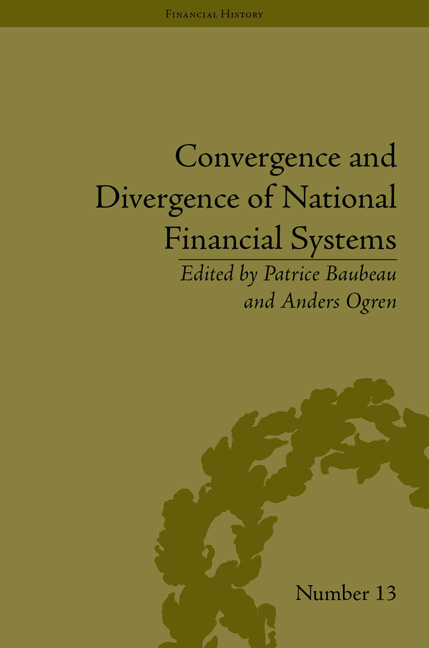 Convergence and Divergence of National Financial Systems
Convergence and Divergence of National Financial Systems Book contents
- Frontmatter
- CONTENTS
- Acknowledgements
- List of Figures
- Introduction
- Part I The Social Mechanisms of Financial Convergence
- 1 Organizations of National Financial Markets and Convergence of Practices: Institutions and Networks of Parisian Brokers in Nineteenth-Century Parisian Financial Markets
- 2 The Resistance of the Lille Marketplace to National Convergence: A Regional Financial System between Autonomy and Sclerosis, 1880–1914
- 3 Competition amongst the French Stock Exchanges during the Second World War
- Part II National Convergences and Divergences in the Long Term
- Part III Convergence and Historical Shocks
- Part IV Convergence and Monetary Constraint
- Notes
- Works Cited
- Index
2 - The Resistance of the Lille Marketplace to National Convergence: A Regional Financial System between Autonomy and Sclerosis, 1880–1914
from Part I - The Social Mechanisms of Financial Convergence
- Frontmatter
- CONTENTS
- Acknowledgements
- List of Figures
- Introduction
- Part I The Social Mechanisms of Financial Convergence
- 1 Organizations of National Financial Markets and Convergence of Practices: Institutions and Networks of Parisian Brokers in Nineteenth-Century Parisian Financial Markets
- 2 The Resistance of the Lille Marketplace to National Convergence: A Regional Financial System between Autonomy and Sclerosis, 1880–1914
- 3 Competition amongst the French Stock Exchanges during the Second World War
- Part II National Convergences and Divergences in the Long Term
- Part III Convergence and Historical Shocks
- Part IV Convergence and Monetary Constraint
- Notes
- Works Cited
- Index
Summary
When switching from national scale to regional scale, the convergence is far from obvious; the same goes for the existence of a true national financial system in France in 1914. It is exactly what the example of the Lille region shows. Controlled by the ‘grand families’ of the commerce and textile industries (which were the dominant activities), this marketplace centralized the capital of a large Northern region (departments of the Nord, Pas-de-Calais and Somme), far beyond the Lille district. Lille was the only regional stock exchange market, and the main banking marketplace, but not the only one. Roubaix, where the Banque de France opened a branch in 1871, sought to emerge as an autonomous banking marketplace relative to Lille (for example, in 1893, the Crédit Lyonnais turned its sub-branch in Roubaix into a full-fledged agency). Nevertheless, it relinquished that role at the beginning of the twentieth century. In consequence, it is moreover significant not to study the regional financial system as a homogeneous whole, but using local peculiarities, in particular in terms of credit. Nevertheless, Lille was one of the first French provincial banking and financial marketplaces with Lyon and Marseille, and powerful enough to resist, if not integration into the national financial system, at least the standards which the Parisian centre tried to impose upon it. In 1881, the branches of the Banque de France in Lille and in Roubaix respectively ranked fifth and sixth on national scale (after Lyon, Marseille, Bordeaux and Le Havre) according to the total volume of their transactions. In 1900, they respectively ranked third (after Lyon and Marseille) and sixth (after Le Havre and Bordeaux). In 1900, the Lille Stock Exchange had become the primary stock exchange among French provinces in terms of stock capitalization, ahead of Lyon.
Still, on the basis of the analysis of the investment flows realized in the region between 1850 and 1914, obtained from the analysis of a sample of company charters filed with the registries of the commercial courts in Lille, Roubaix and Tourcoing, it appears that the Lille region only witnessed very relative industrial diversification at the beginning of the twentieth century.
- Type
- Chapter
- Information
- Convergence and Divergence of National Financial SystemsEvidence from the Gold Standards, 1871–1971, pp. 29 - 50Publisher: Pickering & ChattoFirst published in: 2014


